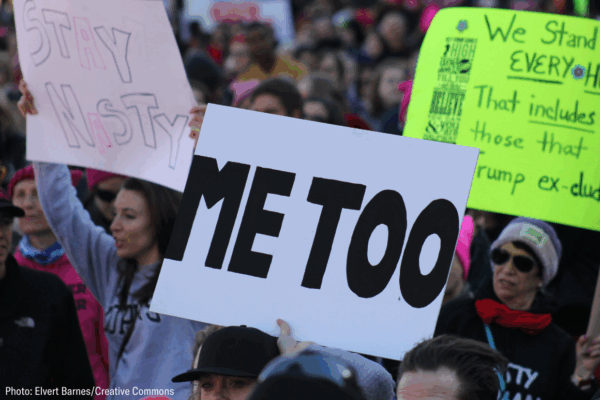By Katie Carline, client of the ACLU of Virginia
UPDATE: Garden Creations and Katherine Carline, represented by the ACLU of Virginia and Paul Falabella of Butler Royals, PLC, have entered into a mutually agreeable settlement of a discrimination complaint under the Virginia Human Rights Act filed earlier this year with the Virginia Division of Human Rights. All matters between the parties involved have been resolved in confidential terms. Garden Creations is an equal employment opportunity employer and does not tolerate sexual harassment in the workplace. The company regrets the circumstances that led to Ms. Carline’s departure and wishes her the best of luck in her career.
“You have no rights." That's all I kept hearing. It’s all everyone was telling me. I had no rights in the Commonwealth of Virginia and there was nothing I could do. I have never felt so defeated.
When I received a text firing me from my job, I couldn’t believe it. It had to be a joke, right? One, it was over a text message, from someone I had known and trusted for more than eight years. Two, it came after I tried to resolve an uncomfortable situation with one of my coworkers. It was also the first time I ever really spoke out against a coworker for sexual harassment. I usually laugh it off. I have been laughing off sexual harassment since I was in high school, and at almost every job I have had before this last one. Women live in fear that speaking up will get us into trouble, looked down upon, made fun of, and even fired. It’s unfortunate that the first time I truly stuck up for myself, I experienced the worst-case scenario.
After a couple weeks of being unable to find another job, I felt stressed about feeding myself and paying my rent, and was getting more and more frustrated with my situation. I decided to reach out to a lawyer who then referred me to the ACLU, an organization I had only heard of on NPR and would follow on social media for updates on various political events. I never thought my case would be taken up, nor did I feel important enough to be an ACLU client.
The ACLU of Virginia took my case and made me feel important. My cause is important, my past is important, how I felt about being sexually harassed is important. I matter, and what I went through matters. I don’t want anyone else who is in my position to have to go through what I did. Everyone has the right to not be discriminated against because of their sex, no matter how many employees the company has. There needs to be a change in the system so that people like me who speak out against sexual harassment aren’t fired because of it and can also obtain aid to help them before they are fired.
I have many girlfriends in the industry who put up with a lot of the “good ol’ boy” mentality, day in and day out. It’s not fair for strong women to be made to feel inferior or less than. We are fully capable of doing the job just as well, often better, than our male peers.
I’ve spent the last seven years working incredibly hard to prove myself and my worth to companies in this industry. I have performed better than most of my male co-workers, and yet I am still handicapped by my sex. I am still thought to be less than because I am a woman.
Females are always challenged in my industry. “How much weight can you lift repeatedly?” “How quickly can you get the labor done perfectly?” “How many breaks can you skip?” “How quickly can you finish your lunch so that we can go back to throwing logs over our shoulders?” Women deal with enough sexism in the workplace without having to put up with sexual harassment and face retaliation for speaking out against it.
It’s scary to speak out and be vulnerable. It’s scary to file a legal complaint against people you have known for years and once respected. I hope that whatever does come from this, at least one person is positively affected and more people are aware of the struggles many women deal with at work. I hope this case makes change and inspires other people like me to do something about it.

